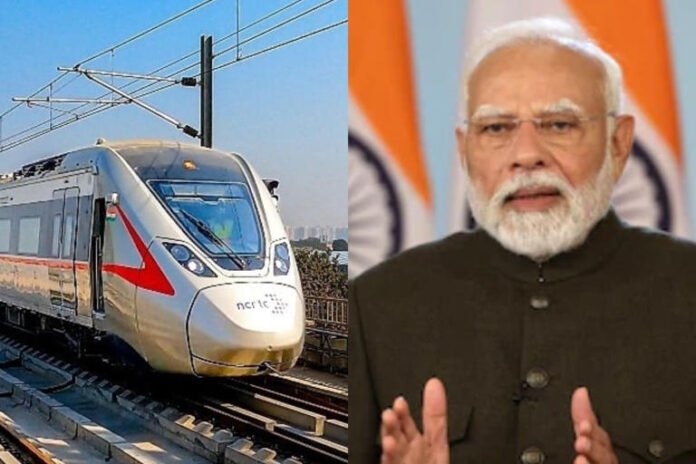New Delhi, January 5, 2025: Prime Minister Narendra Modi today inaugurated a series of transformative infrastructure projects in the National Capital Region (NCR), with a total investment of over ₹12,200 crore. The landmark initiatives include the Namo Bharat Rapid Rail Transit System (RRTS), expansions to the Delhi Metro, and the launch of the Central Ayurveda Research Institute (CARI), among others. These projects aim to significantly improve urban connectivity, healthcare, and the quality of life for millions of residents.
1. Namo Bharat Corridor (Delhi-Ghaziabad-Meerut)
The Prime Minister inaugurated a 13-kilometer stretch of the Delhi-Ghaziabad-Meerut RRTS, connecting Sahibabad in Ghaziabad to New Ashok Nagar in Delhi. This corridor, built at a cost of ₹4,600 crore, marks Delhi’s first Namo Bharat connectivity.
Key Features of the Namo Bharat Train:
- High-Speed Transit: Capable of reaching speeds of up to 180 km/h, reducing travel time between Delhi and Meerut to under 40 minutes.
- Modern Amenities: Includes Wi-Fi, ergonomic seating, luggage racks, and priority areas for differently-abled passengers.
- Sustainability: The trains are energy-efficient, utilizing regenerative braking technology to minimize carbon emissions.
Impact on Daily Commuters:
- The corridor is expected to revolutionize regional transit by reducing dependency on private vehicles.
- Enhanced safety, punctuality, and comfort will attract a broader spectrum of daily commuters.
Engineering Feats:
- Seamless Integration: Features advanced signaling systems and elevated tracks to ensure uninterrupted operations.
- Precision Construction: The project was completed with state-of-the-art engineering to navigate dense urban areas while minimizing disruptions.
2. Delhi Metro Phase-IV Expansion
A new 2.8-kilometer stretch between Janakpuri and Krishna Park was inaugurated, costing ₹1,200 crore. This extension is expected to enhance connectivity for residents in West Delhi, integrating with the broader metro network.
Benefits:
- Provides faster access to educational institutions, workplaces, and healthcare facilities.
- Reduces road congestion and promotes the use of public transportation, contributing to reduced vehicular emissions.
3. Foundation for Rithala-Kundli Metro Corridor
The Prime Minister laid the foundation stone for the 26.5-kilometer metro corridor connecting Rithala in Delhi to Kundli in Haryana. With an estimated cost of ₹6,230 crore, this corridor will enhance cross-state connectivity and economic integration in the region.
4. Central Ayurveda Research Institute (CARI)
A new state-of-the-art facility in Rohini, built with an investment of ₹185 crore, was also inaugurated. The institute will advance Ayurvedic research and provide modern healthcare solutions, supporting India’s traditional medicine sector.
Enhancing Multi-Modal Connectivity
The Namo Bharat corridor integrates seamlessly with existing metro lines and other transportation systems, creating a unified network for commuters. Passengers will benefit from reduced transfer times and improved first- and last-mile connectivity.
PM Modi’s Engagements
As part of the day’s events, Prime Minister Modi took a ride on the Namo Bharat train from Sahibabad to New Ashok Nagar. He highlighted the transformative potential of these projects and reiterated the government’s commitment to urban development and sustainable infrastructure.
These projects are set to boost regional connectivity, ease traffic congestion, and support economic growth in Delhi and its neighboring states. By investing in cutting-edge transit solutions and healthcare facilities, the government aims to improve the quality of life for millions of residents, fostering a more connected and sustainable future.



